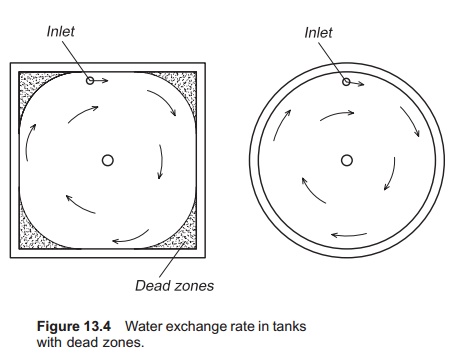Chapter: Aquaculture Engineering : Tanks, Basins and Other Closed Production Units
Ideal or non-ideal mixing and water exchange
Ideal or non-ideal mixing and water exchange
The aim in
designing a closed production unit including the inlet and outlet, is to
achieve the most effective mixing as possible of the new incoming water to the
old water together with a good exchange of water in the entire farming volume.
No new water must go directly to the outlet, by what could be called a short
cut; neither must there be areas or zones in the unit were there is small or no
exchange of water, so called ‘dead zones’ (Fig. 13.4). Since water exchange
does not occur in the completely dead zones, no new water or oxygen is
sup-plied, so the fish will prefer not to stay there and the effective farming
volume will be reduced below the real tank volume. If there are short cuts,
part of the inlet water will go directly to the outlet without having been
properly utilized by the fish; this results is non-ideal mixing. Short cuts
will also give zones in the unit where the water flows much more slowly and
than elsewhere water exchange will therefore not be satisfactory.

A picture of
the velocity gradients within the production unit can be found by using a
specially designed small propeller – a velocity meter – to measure the flow
rate at different points in the tank both horizontally and vertically (different
depths). Eventually, dead zones and zones where the water flow is too fast will
also be identified.
A number of
factors, including design of the tank, the inlet and the outlet, will affect
water exchange. Before starting to use a new tank design or inlet or outlet
system, it is advantageous to test the flow pattern in the tank and find the
velocity gradients.
Related Topics